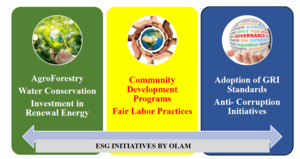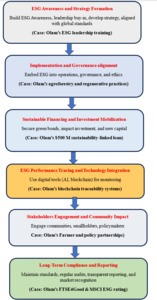Introduction
ESG is a basket of indicators that assess corporate ethicality, sustainability, and governance practices. Across African markets, the promise of ESG often stalls at execution. Organizations face uneven regulatory enforcement, high informality, financing frictions, and varying social conditions across locations. These factors complicate “lift-and-shift” adoption of global standards and push managers to search for context-fit, measurable roadmaps. Recent studies reinforce this need for pragmatism, which Africa-focused scholarship has highlighted the centrality of capable, values-driven leadership to embed sustainability in daily decisions, while also urging managers to convert principles into action in institutionally thin contexts (Wolf-Gillespie & de Klerk, 2025). Being familiar with materiality tools, sustainability teams repurpose them to anticipate and manage geopolitical exposure, from supply chain disruptions to disclosure pressure, offering managers a concrete bridge between risk sensing and ESG priority setting (Habegger, 2024).
Beyond the organizations, Africa’s social conditions, norms, identities, and community expectations shape legitimacy and value creation; ignoring them raises the risk of implementation failure, whereas structured “moralized value creation” strategies can align corporate action with local expectations and development needs (Odek, 2024). With the transition of international financial markets towards sustainable financing, African businesses must calibrate with ESG frameworks to gain investor trust and consent to operate in global markets. Regional Economic Communities and the African Continental Free Trade Area (AFCFTA) offer prospects for policy harmonization and suggest hybrid models for corporate performance and sustainability (Songi & Dias, 2019).
To address the ESG execution gap in African markets, this article presents an Africa-specific adoption path grounded in an illustrative case of Olam International and triangulated secondary evidence. The route follows six steps: strategy alignment, materiality-led prioritization, supplier traceability pilots, partner-enabled community engagement, transition-oriented financing options, and disclosure readiness. Each step pairs with indicative metrics and role for public agencies, DFIs, and community organizations. Based on this, the study posits the following research question based on these objectives.
Research Question: How can African firms align with forthcoming ESG frameworks to ensure compliance and leverage them for strategic benefits in international business?
This article emphasizes leadership for sustainability execution in Africa, the use of materiality for risk governance, and the translation of principles into context-fit managerial actions. The study contributes to consolidating the path with clear roles and indicative metrics.
Case Study and Research Design: ESG Integration in a West African Agribusiness
Case Background
To explore existing ESG adoption within the regulatory and institutional conditions, we have selected Olam International, a leading agribusiness firm with a presence across sub-Saharan Africa. This research selected Olam because it integrated its operations with ESG principles despite many constraints, such as regulatory gaps, weak enforcement mechanisms, and fragmented governance. Olam sets an example for other African firms on how global sustainability standards can be adhered to by taking simple initiatives like renewable energy investment, issuing green bonds, engaging in community health through green finance, and enhancing supply chain efficiency by leveraging technology. The main aim of this case-based study is to formulate an actionable and replicable ESG framework for African firms that can be applied in their efforts to implement sustainability practices in a similar business environment, thus contributing both to academics and hands-on policy development.
Figure 1 demonstrates how African firms can lead ESG adoption under institutional constraints.
Methodology
The study employs a qualitative case study method to generalise the sustainability practices adopted by Olam and replicate them for other organisations working in similar regulatory conditions in sub-Saharan Africa. It is cognisant of earlier theoretical sampling logic (Yin, 2009) for Olam as a representative illustration.
Olam International acted as a model case study for ESG adoption in the agribusiness sector for this qualitative case study design. The methodology employed was multi-dimensional, including data collection from secondary sources like ESG disclosures and annual sustainability reports from the Olam official websites, published articles (2017-2023), relevant industry whitepapers, and independent sustainability directories (FTSE4Good, MSCI ESG Ratings). Using a grounded theory approach, the study investigated the data about the sustainability practices of Olam International, categorised them into thematic clusters, and synthesised the existing African ESG framework. This method usages empirical observations to derive a framework for components, ensuring contextual and theoretical importance. This study focuses on a systematic analysis of secondary data available on open source, detecting trends and practices in ESG adoption. The research cross-verifies ESG performance metrics through data triangulation from different independent sources to enhance the reliability and validity of findings. This integrated approach helps in capturing real-world context while developing meaningful theory. It ensures the findings made sense for one case and could apply to similar business settings across Africa.
ESG Framework: Strategic Guidelines for Africa
The propose ESG framework in Table 1 offers a structured, context-specific roadmap for facilitating Environmental, Social, and Governance adoption across African enterprises. The framework provides four critical domains representing the most prominent institutional and operational voids impeding ESG advancement in Africa. These domains encompass structural, financial, and socio-cultural essential challenges in sustainability transitions in emerging economies.
This framework engages with and extends existing international business theories by contextualizing them within the African ESG landscape, such as drawing on institutional theory, which demonstrates how firms respond to institutional voids, such as weak regulatory enforcement and fragmented governance, by developing alternative governance mechanisms and aligning with global ESG norms. Building on resource dependence theory highlights how African firms adapt their strategies to secure external ESG-linked capital in resource-constrained environments. The framework extends IB theory by addressing how systemic constraints unique to emerging economies shape ESG adoption.
Regulatory and Governance Context
In this context, we address weak enforcement, fragmented ESG standards, and governance corruption. The ESG framework of the study advocates harmonization through AfCFTA, standardized reporting protocols, and policy incentives to drive compliance. Strengthening transparency, accountability, and anti-corruption initiatives is essential to building institutional trust. The path forward lies in continuous cross-border collaboration and alignment with evolving regional ESG norms.
Financial and Investment Context
Under this context, the study addresses challenges African firms face in accessing ESG-related capital, such as resource scarcity, limited infrastructure, and low awareness. It suggests leveraging global interest in green investments, promoting ESG-linked products, impact financing, and carbon markets, as well as strengthening local green bond markets.
Operational and Technological Context
This domain discusses overcoming barriers to ESG adoption in Africa, including high implementation costs, limited digital infrastructure, and technical skills, by investing in advanced technologies like blockchain, promoting regenerative practices supported by Public-Private Partnerships (PPPs) and NGO involvement, and establishing continent-wide technology standards.
Cultural and Organizational Context
This domain suggests addressing internal resistance to change, traditional business practices, and limited ESG awareness among leadership and employees through comprehensive training, strong ESG leadership, and integrating ESG values into corporate culture. The long-term solution is embedding ESG principles into organizational norms and reinforcing them through strategic engagement.
A comparative analysis, as shown in Table 2, highlights the African ESG framework’s distinctiveness – strong financing focus, regional and cultural specificity, and alignment with African regulatory efforts, unlike global tools like GRI or SDG Compass.
Strategic Path for ESG Adoption in Africa
In this section, the study presents an ESG roadmap for African enterprises, integrating sustainability objectives with strategic competitiveness. In the hybrid theoretical foundation, institutional theory explains how African firms respond to weak regulatory infrastructures by self-regulating and mimicking global ESG norms. In contrast, stakeholder theory emphasizes inclusive engagement with communities and investors. Resource dependence theory frames the reliance on external capital for ESG mobilization, and legitimacy theory captures the long-term strategic goal of aligning ESG actions with global expectations to gain credibility, funding, and market access. These theories explain how ESG strategies emerge, adapt, and succeed in complex African business environments. Figure 2 illustrates a strategic pathway, emerging into a structured roadmap for holistic ESG implementation in African businesses, based on the Olam International case study.
Step 1: ESG Adoption and Strategy Formulation
The starting point is to build ESG awareness and its benefits, formulate a sustainability strategy focusing on executive development, risk assessment, and align corporate goals with international standards for any African organization. Olam International launched sustainability leadership training programs for ESG integration across its supply chain.
Step 2: ESG Implementation and Governance Alignment
Taking a cue from Olam’s successful agroforestry and regenerative agriculture execution, it displays a balance between immediate environmental impact reduction and long-term sustainability. Thus, organisations must integrate ESG principles into their operations, emphasizing strong governance mechanisms, sustainability imperatives, and ethical business practices.
Step 3: Sustainable Financing and Investment Mobilization
Green financing access, like green bonds and ESG investment options, is vital for effective ESG implementation. Olam secured $500 million in funding green through sustainability-centred loans, leading Africa’s sustainable finance transition.
Step 4: ESG Performance Tracking and Technology Integration
ESG performance measurement systems are created and executed to review the performance periodically, leveraging digital tools like AI analytics and blockchain to enhance supply chain traceability and reporting. Olam’s groundbreaking blockchain traceability system has elevated its operations to global ESG requirements.
Step 5: Stakeholder Engagement and Community Impact
It requires strong engagement with local communities and the regulatory environment for effective ESG adoption and implementation. Engagement with farmers holding small land parcels and policymakers optimises stakeholder engagement, resulting in sustainable cocoa farming and improved socio-economic conditions for Olam International.
Step 6: Long-Term Compliance and Reporting
Gaining trust in the market by any firm means not just doing business; it requires a deep, ongoing assurance of international ESG standards and regular audits. Our case of Olam exemplifies this dedication through its strong MSCI ESG Rating and its place in the FTSE4Good Index, which signals responsible and transparent business practices.
This article provides a strategic path for a holistic, replicable framework for ESG adoption in Africa, balancing theoretical rigor with practical insights. With the help of the Olam case, this article demonstrates how firms can achieve robust governance, investor confidence, and sustainability-driven growth in African markets.
Conclusion
This research follows a qualitative case study approach to building an ESG framework for African organisations, as confirmed by the Olam International case. The given framework helps managers sequence activities, specify who does what, and highlight near-term indicators. This research is design for institutionally thin settings where informally, uneven enforcement, and financing frictions often derail ESG programs. The framework integrates institutional and stakeholder perspectives with risk and financing considerations to clarify how ESG can create operational resilience and legitimacy in African contexts. This research provides theoretical insights and offers a well-structured practical roadmap for African businesses and policymakers to address regional ESG challenges. By grounding the findings and the framework in real-world situations, the study ensures its relevance and adaptability, making it a valuable tool across sectors and institutional settings throughout the continent.
Funding
The author did not receive support from any organization for the submitted work.
Competing interests
The Author certifies that they have no affiliations with or involvement in any organization or entity with any financial or non-financial interest in the subject matter or materials discussed in this manuscript.
Author contributions
The author whose name appears on the submission made substantial contributions to the conception or design of the work, or the acquisition, analysis, or interpretation of data, or the creation of new software used in the work.
About the Author
Sharan Bhawani is an FPM Scholar in Marketing at XLRI, Jamshedpur, India. He earned a gold medal in MBA from IIT (ISM) Dhanbad and has brought over 16 years of corporate leadership in business development, brand management, product strategy, and sales distribution across Telecom and FMCG sectors with Marico, Coca-Cola, Reliance Communications, Bharti Airtel, and Diageo. His research interests include Sales force automation, brand management, ESG, and DEI, focusing on sustainability-oriented consumer behavior.




